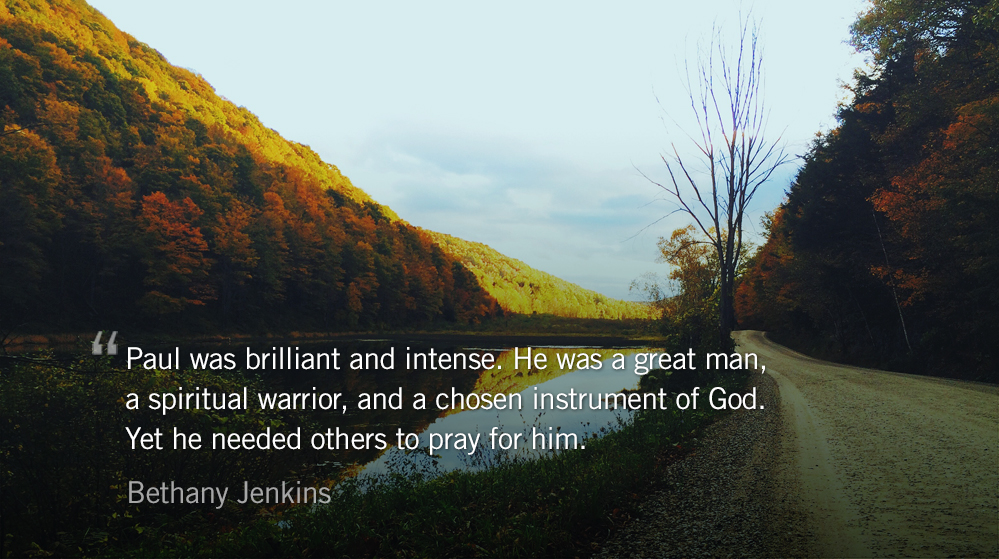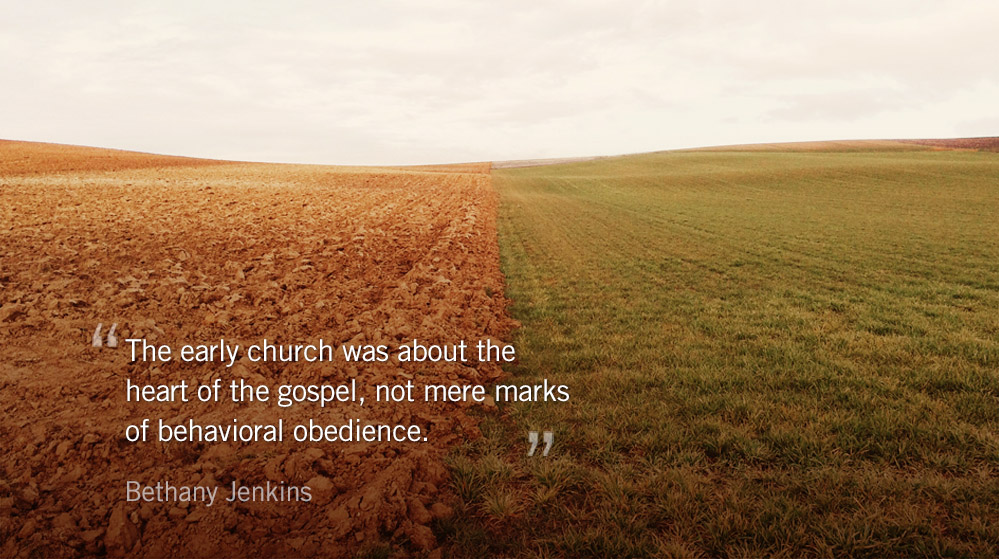2 Corinthians 11.24-27Five times I received at the hands of the Jews the forty lashes less one. Three times I was beaten with rods. Once I was stoned. Three times I was shipwrecked; a night and a day I was adrift at sea; on frequent journeys, in danger from rivers, danger from robbers, danger from my own people, danger from Gentiles, danger in the city, danger in the wilderness, danger at sea, danger from false brothers; in toil and hardship, through many a sleepless night, in hunger and thirst, often without food, in cold and exposure.
1 Corinthians 7:31
(From now on let) those who deal with the world live as though they had no dealings with it. For the present form of this world is passing away.
Today’s Readings
1 Samuel 26 (Listen – 4:30)
1 Corinthians 7 (Listen – 6:09)
Readers’ Choice (originally published April 22, 2015)
“‘The glory of grace’ is something I somehow manage to overlook in daily life. How amazing that God would give his only Son for me? That the pain of my sin would fall on his shoulders? And yet, He loves me. He loves me.” — Anna
Psalm 33:10-11
The Lord brings the counsel of the nations to nothing; he frustrates the plans of the peoples. The counsel of the Lord stands forever, the plans of his heart to all generations.
After the Boston Marathon bombings, Stephen Colbert mocked the terrorists, saying their intentions were thwarted by the very people they tried to hurt: “But here is where these cowards really don’t get. They attacked the Boston Marathon. An event celebrating people who run twenty-six miles on their day off … And when those bombs went off, there were runners who, after finishing a marathon, kept running for another two miles to the hospital to donate blood. So here’s what I know. These maniacs may have tried to make life bad for the people of Boston, but all they can ever do is show just how good those people are.”
In Psalm 33, the Psalmist sings, “The Lord brings the counsel of the nations to nothing; he frustrates the plans of the peoples. The counsel of the Lord stands forever, the plans of his heart to all generations.” Thousands of years ago, “lawless men” sought to silence the King of Glory, but God frustrated their plans.
As Peter said, “Jesus of Nazareth, a man attested to you by God with mighty works and wonders and signs that God did through him in your midst, as you yourselves know—this Jesus, delivered up according to the definite plan and foreknowledge of God, you crucified and killed by the hands of lawless men. God raised him up, loosing the pangs of death, because it was not possible for him to be held by it.”
In Spectacular Sins, John Piper writes, “In the death of Christ, the powers of darkness did their best to destroy the glory of the Son of God. This is the apex of evil. But instead they found themselves quoting the script of ancient prophecy and acting the part assigned by God. Precisely in putting Christ to death, they put his glory on display—the very glory that they aimed to destroy. The apex of evil achieved the apex of the glory of Christ. The glory of grace.”
Prayer
Lord, although much about the bombings in Boston remains a mystery to us, we know one thing—when we see terrorists try to spread fear and hatred and, instead, spread love and compassion, we see your glory. No plan of yours can be thwarted—not even when evil appears to have won. Give us a vision for spectacular sins that achieve the apex of Christ’s glory. Amen.
Today’s Readings
1 Samuel 17 (Listen – 8:59)
Romans 15 (Listen – 4:32)
Bethany Jenkins (originally published April 23, 2014)
Readers’ Choice
“The prayer at the end sums it up beautifully: Prayer: Lord, longsuffering is not passive, but aggressive. It takes power of soul.'” — Sam
Titus 2 11-14
11 For the grace of God has appeared that offers salvation to all people. 12 It teaches us to say “No” to ungodliness and worldly passions, and to live self-controlled, upright and godly lives in this present age, 13 while we wait for the blessed hope—the appearing of the glory of our great God and Savior, Jesus Christ, 14 who gave himself for us to redeem us from all wickedness and to purify for himself a people that are his very own, eager to do what is good.
Waiting: We are all in the waiting room — for a test result, for a baby, for a wedding day, for a job offer. Here, in Titus 2, we read that we are “waiting for our blessed hope, the appearing of the glory of our great God and Savior Jesus Christ.” How do we wait, though, without growing cynical, idolatrous, and despairing?
Eros: Perhaps the old word for patience — long-suffering — better describes how we experience waiting. In Love Within Limits, Lewis Smedes contrasts patience born of natural love (eros) with patience born of divine love (agape). He writes, “Erotic love has no power for longsuffering. Eros is desire … It can be frustrated when we do not get exactly and enduringly what we long for. It can be betrayed when people renege on a promise to fulfill our need. It can be burned out when what filled us for a season suddenly leaves us empty. Born from suffering, eros is destined for suffering. That erotic love does not have power to suffer long is its built-in tragedy. It must suffer, but it has no strength for longsuffering. Eros cannot wait.”
Agape: Agape, however, “has the power to be creatively weak. Because it is not driven by ardent need, it has power to wait. It gives power to accept life, to find goodness in living while we are victims of situations we despise. This is the only way to explain two attitudes we observe in Jesus toward his own horrible suffering. In Gethsemane, we hear him plead with God to be spared the cross that lay ahead … The next day, as he bears his cross to Calvary, he tells the weeping women who follow him: ‘Don’t cry for me.’ Here we see his power to affirm himself as the loving Lord and free Savior who chose to suffer, to be a victim of suffering. He was not a helpless victim of tragedy; he was a powerful person who chose to be weak. He had the strength to become a victim even while he affirmed his own life as free in obedience to love.”
Prayer: Lord, long-suffering is not passive, but aggressive. It takes power of soul. Our only hope in waiting, therefore, is the power of your divine love that moves us toward one another and toward you. May we seek your face and find your love that we may be longsuffering. Amen.
Daily Reading
Judges 20 (Listen – 7:13)
Acts 24 (Listen – 4:11)
Acts 15.11
Peter said, “We believe that we will be saved through the grace of the Lord Jesus, just as they will.”
When it comes to the topic of religion, our culture frequently vacillates between two extremes. On one extreme, we are relativists. As comedian George Carlin once said, “Religion is like a pair of shoes… Find one that fits for you, but don’t make me wear your shoes.”
On the other extreme, we are legalists. As the men from Judea insisted, “Unless you are circumcised according to the custom of Moses [i.e., obey the letter of the law], you cannot be saved.”
Where does the gospel fit on this spectrum?
Here, in Acts 15, the Jerusalem Council had to decide whether the new Gentile converts needed to be circumcised in order to receive the full blessings of Christ. Paul and Barnabas didn’t think they did. They argued that God had already given the Holy Spirit to the Gentiles apart from circumcision. Why, they asked, should man place a requirement on them when God had not?
The Council agreed. But when they wrote to the new converts, they added some requirements — “that you abstain from what has been sacrificed to idols, and from blood, and from what has been strangled, and from sexual immorality.” How were these not legalistic add-ons?
Peter and Paul tried to contextualize the gospel as much as possible. Elsewhere Paul writes, “I have become all things to all people that by all means I might save some. I do all things for the sake of the gospel, that I may share with them in its blessings.”
On the one hand, they avoided legalism — here, the requirement of circumcision. On the other hand, there is a point that our contextualization becomes permissive and leads to relativism. Here, the prohibitions they added were activities traditionally associated with idol worship. They were about the heart of the gospel, not mere marks of behavioral obedience.
Prayer
Lord, the love of Christ compels us because he died for us that we may no longer live for ourselves, but for him who died and was raised again. Yet we confess that we often tend toward relativism or legalism. We give you thanks, however, for giving us the ministry of reconciliation. Give us hearts full of courage and love. Make us “Greeks to the Greeks,” contextualizing the word in the world. Amen.
Today’s Readings
Judges 11 (Listen – 5:53)
Acts 15 (Listen – 5:49)











